
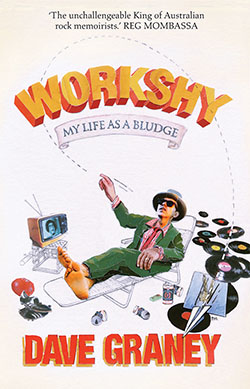 Let's get one thing straight: Musicians do work. It may not be work as we know it, Jim, but it is a form of employment, and it requires a well-defined skillset.
Let's get one thing straight: Musicians do work. It may not be work as we know it, Jim, but it is a form of employment, and it requires a well-defined skillset.
Talent is important but so is patience. Professional musicians do more waiting around than almost any other occupation on Earth. Other than midwives - and at least they receive universal praise.
Solo artist, ex-Moodist and leadr of the White Buffalos, Coral Snakes and more, Dave Graney, knows this about his trade and much more. He conveys much wisdom in "Workshy". It is the ideal read for anyone thinking about sending their offspring into rock and roll. Which is where Dave hides. Pun intended.
"Workshy" is Dave's second autobiography. I know what you're thinking: He might have been crowned King of Australian Pop but where does Graney get off writing TWO books about himself? Well, Billy Thorpe managed to do it. And more of Dave's books might be true. Both men have bodies of work with parts that are wryly funny. I could be referring here to The Aztecs' "The Hoax Is Over". "Workshy" is considerably more focussed than that mess.
- Details
- By The Barman
- Hits: 6575
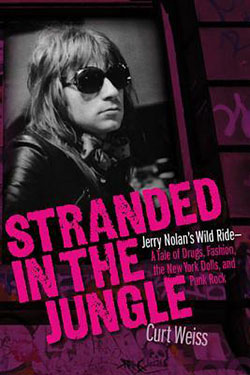 The cover does not lie. It was a wild ride for Jerry Nolan, drummer from the New York Dolls and Johnny Thunders and the Heartbreakers. And it’s all outlined in detail in Kurt Weiss’s gripping, 310-page biography.
The cover does not lie. It was a wild ride for Jerry Nolan, drummer from the New York Dolls and Johnny Thunders and the Heartbreakers. And it’s all outlined in detail in Kurt Weiss’s gripping, 310-page biography.
Much of the wild nature of the journey was self-induced: in a New York underground rock scene where junkies were prominent, Jerry was one of the most notorious. A bigger fiend than his running mate Johnny Thunders, some say.
His death at the unripe age of 45 - on life support, fighting bacterial meningitis and pneumonia - was more than likely related to his two decades of intravenous heroin use. He was HIV-positive at the end - and possibly in the grip of AIDS, the author suggests.
Curt Weiss (aka Lewis King) drummed in Beat Rodeo and succeeded Nolan in the lesser-known Rockats. He met Nolan only in passing. His style is incisive and direct, and his critical faculties are those of a rock and roll player, which is no bad thing when talking about Nolan's technique.
- Details
- By The Barman
- Hits: 10450
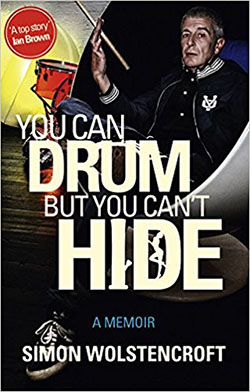 The Rise, The Fall and The Rise - Brix Smith Start (Faber)
The Rise, The Fall and The Rise - Brix Smith Start (Faber)
The Big Midweek: Life Inside The Fall - Steve Hanley and Olivia Piekarski (Route)
You Can Drum But You Can't Hide - Simon Wolstencroft (Route)
Yep, You read the headline correctly. I'm serious. Cobain was such a fan of The Fall he tried to get on their tour bus and travel with them.
The Fall refused.
There's an absence in our culture. You may not have noticed. It's like some necessary abscess has been entirely excised from our cultural body. We needed that pain, that savagery, to tell us what we are, what we shouldn't be, and to remind us that we can be more than what we are.
This article is all about Mark E. Smith. Because his personality, his drive and charisma shoved a certain rock'n'roll band forward through barrier after barrier...
- Details
- By Robert Brokenmouth
- Hits: 6889
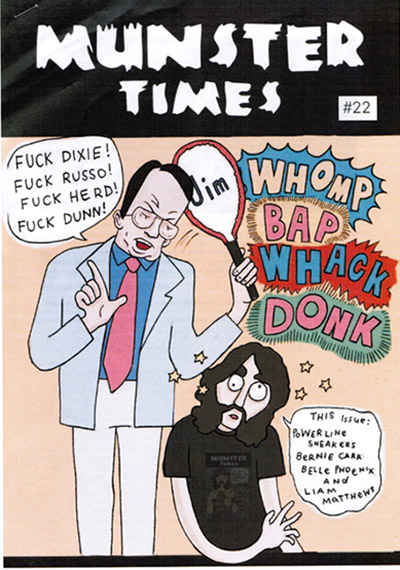 Everybody of a certain vintage who follows non-mainstream rock and roll has a soft spot for ‘zines. One of the reasons you’re reading this electronic magazine is down to two, 48 Crash and Vicious Kitten.
Everybody of a certain vintage who follows non-mainstream rock and roll has a soft spot for ‘zines. One of the reasons you’re reading this electronic magazine is down to two, 48 Crash and Vicious Kitten.
48 Crash was the archetypal Sydney zine of the early ‘80s. Hand-written (and coloured, sometimes), its photocopied pages spoke of Le Hoodoo Gurus, the Visitors, the three-piece Screaming Tribesmen and the Lipstick Killers - bands that struggled to attract mainstream attention elsewhere. It championed the so-called Detroit Sound that fuelled the Sydney music scene for more than a decade.
Ten years later, Vicious Kitten was an offshoot of the record label of the same name and professional publication that aimed its lens at people like Johnny Thunders, Kevin K, Jeff Dahl and Freddy Lynxx. Very Lower East Side, in spirit.
An honourable mention also to Sydney's B Side, that covered the left-of-centre, extreme local musical scene. Unbelievably Bad fills the same niche today. There were the rock local papers (RAM, the bible, and Juke) that were consumed religiously, but zines had all the cool stuff and never mentioned Chisel, Icehouse or Farnham.
- Details
- By The Barman
- Hits: 7326
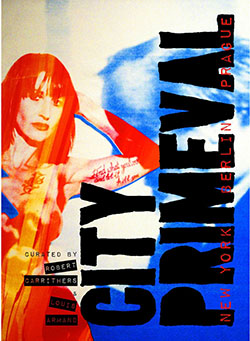 You may, or may not, see this book in shops. If you do, buy it. Most of the readers here will want to read the New York section. So don’t hesitate.
You may, or may not, see this book in shops. If you do, buy it. Most of the readers here will want to read the New York section. So don’t hesitate.
But I’m s’posed to be a critic or something and The Barman wants to know: how many McGarretts? In spite of the several things which annoy the hell out of me, "City Primeval" rates a mighty Three McGarretts. Yep: 100 percent..
Why so high, Grand-dad?
Well, the concept alone is mighty. And it could’ve been seriously terrible. But "City Primeval" is one of those unique, slanted historiography things which are invaluable to any music/ culture enthusiast. Sure, the book could’ve done with a decent editor, and sure some of the people writing here don’t usually write so it’s not the smoothest.
But that’s not the point, at all, and in fact is part of the charm. Reading "City Primeval" doesn’t just give us a bit more context, but part of the "ah-HA!" understanding which so many outsiders to any florid scene lack.
- Details
- By Robert Brokenmouth
- Hits: 6841
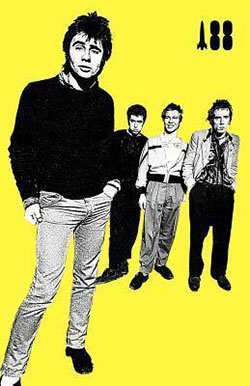 Get this book. If you don’t have it, get this book now. If you do have it - but not this edition - get this book now.
Get this book. If you don’t have it, get this book now. If you do have it - but not this edition - get this book now.
If you do have a copy of this edition, get copies of "I Was a Teenage Sex Pistol" and give them to your friends, relations, people you know hate punk rock, everyone you know who reads biographies, and especially, your other half.
Why? Apart from coming across like he’s speaking the truth plainly without over-egging the thing, it’s occasionally so funny it makes your cocoa go down the wrong way and come out of your nose.
Or perhaps that’s just me; try this: After the Grundy Incident, "I didn’t speak to my mum for about a week. When I finally did talk to her, all she could say was, 'Glen, it’s terrible what you’ve done, you used to be such a nice boy, no every time I go to work … they call me Mrs Sex Pistol.'”
I had to change my top and leave it in the sink overnight to soak out the cocoa stain.
- Details
- By Robert Brokenmouth
- Hits: 7067
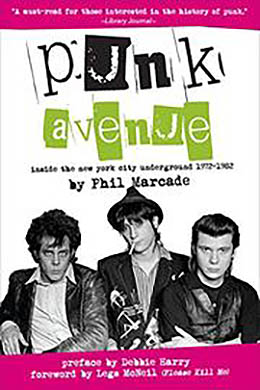 Phillippe Marcade was briefly drummer and then frontman for long-running New York City band The Senders, and a close confidant of many on the CBGB and Max’s Kansas City scenes.
Phillippe Marcade was briefly drummer and then frontman for long-running New York City band The Senders, and a close confidant of many on the CBGB and Max’s Kansas City scenes.
Born in France, for the most illegally living in NYC, he rode the rock and roll roller coaster as hard as anyone in Lower Manhattan.
“Punk Avenue” - the title is a play-on-words reference to the Park Avenue location of Max’s - is a fantastic read. There are no dead spots; Marcade tells his story colourfully, underlined by droll, self-deprecating humour.
- Details
- By The Barman
- Hits: 9689
 It’s been said that everybody does have a book in them, but in most cases that's where it should stay. Melbourne musician Kim Volkman begs to differ.
It’s been said that everybody does have a book in them, but in most cases that's where it should stay. Melbourne musician Kim Volkman begs to differ.
Now, he’s not exactly a household name so you could well ask what business Volkman has writing an autobiography. If you do I’ll not-so-respectfully point out that Justin Bieber has five (allegedly) self-penned books against his name on Amazon right now.
It helps that Volkman has led an interesting musical life. Guitarist with Ian Rilen and the Love Addicts - one of the most underrated, raw and real bands to appear on Australian stages in the last 30 years - he’s also had three stints filling his late ex-band leader’s bass spot in X.
Volkman’s played with many lesser-known bands - including his own very good Whiskey Priests. Unlike Justin Bieber, he’s never had notable success. That’s probably a good thing in Kim’s case - on his own admission, it might have killed him.
- Details
- By The Barman
- Hits: 9744
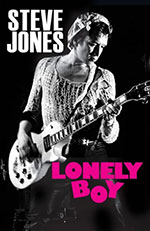 Here are two books from people whose names you may know that are essential purchases.
Here are two books from people whose names you may know that are essential purchases.
This is from “Lonely Boy”:
… all bands are basically the fucking same. The reason I still - to this day - love watching documentaries about bands like the Eagles … is that I can totally relate to them. The personalities involved and the reasons for the tensions between them never seem to change.
The singer - because the job requires the kind of person who wants to be in the front going ‘look at me, look at me’ - will almost always be very insecure, and usually a bit of a cunt. Then there’s the guitarist, who wants to get all the pussy, and there’s always at least one weird introvert…
Lead Guitarist Syndrome and Lead Singer Syndrome are terms you don’t see in the Macquarie, or the OED. But they exist, in fact if not in print.
- Details
- By Robert Brokenmouth
- Hits: 7324
More Articles …
- Unbelievably Bad zine Issue 20
- The Psychedelic Confessions of a Primal Screamer – Martin St John (Lulu Publishing)
- Know Your Product: The art of Australia's underground 45s
- Road Series by Hugo Race (Transit Lounge)
- Neon Angel. A Memoir of a Runaway by Cherie Currie with Tony O’Neill (Harper Collins/Itbooks)
- MDC. Memoir From a Damaged Civilization. Stories of Punk, Fear and Redemption by Dave Dictor (Ma nicD Press)
Page 7 of 10

